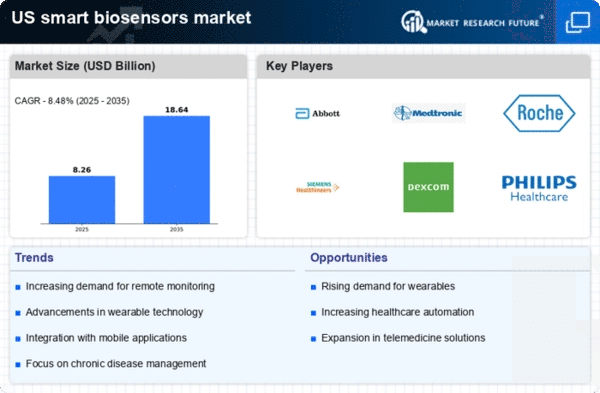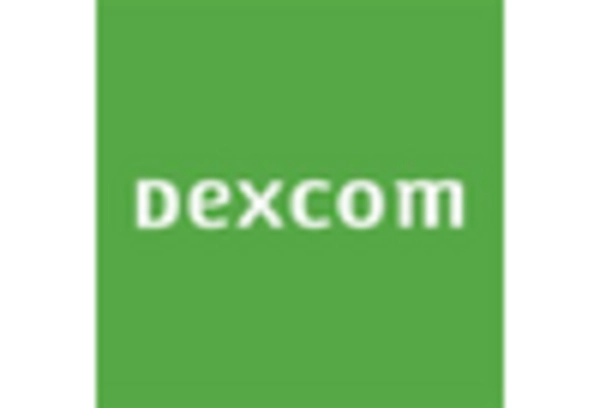Rising Consumer Awareness and Education
Consumer awareness and education regarding health monitoring technologies are emerging as vital drivers for the smart biosensors market. As individuals become more informed about the benefits of proactive health management, the demand for smart biosensors is expected to rise. Educational initiatives and marketing campaigns by manufacturers are playing a crucial role in disseminating information about the advantages of these devices. In 2025, it is estimated that consumer engagement in health technology will increase by over 30%, leading to higher adoption rates of smart biosensors. This heightened awareness not only encourages individuals to invest in their health but also drives manufacturers to enhance product offerings. The interplay between consumer education and market growth is likely to create a favorable environment for the smart biosensors market.
Rising Demand for Wearable Health Devices
The increasing consumer inclination towards wearable health devices is a pivotal driver for the smart biosensors market. As individuals become more health-conscious, the demand for devices that monitor vital signs and health metrics in real-time has surged. According to recent estimates, the wearable technology market is projected to reach approximately $60 billion by 2025, with a significant portion attributed to smart biosensors. These devices enable continuous monitoring of health parameters, thus facilitating early detection of potential health issues. The integration of smart biosensors into wearables enhances their functionality, making them indispensable tools for personal health management. This trend is likely to propel the smart biosensors market forward, as manufacturers innovate to meet consumer expectations for accuracy and reliability.
Growing Focus on Chronic Disease Management
The rising prevalence of chronic diseases in the U.S. is a significant driver for the smart biosensors market. With conditions such as diabetes, cardiovascular diseases, and obesity on the rise, there is an urgent need for effective monitoring solutions. Smart biosensors offer real-time data that can aid in the management of these conditions, allowing for timely interventions. The market for chronic disease management solutions is projected to grow at a CAGR of over 15% through 2025, indicating a robust demand for smart biosensors. These devices not only empower patients to take control of their health but also provide healthcare professionals with critical data to tailor treatment plans. This growing focus on chronic disease management is likely to enhance the adoption of smart biosensors in various healthcare settings.
Increased Investment in Healthcare Technology
Investment in healthcare technology is a crucial driver for the smart biosensors market. The U.S. government and private sector are channeling substantial funds into research and development of advanced biosensing technologies. In 2025, healthcare technology investments are expected to exceed $200 billion, with a notable share directed towards smart biosensors. This influx of capital fosters innovation, leading to the development of more sophisticated biosensors that can provide accurate and timely health data. Furthermore, as healthcare systems increasingly adopt digital solutions, the demand for smart biosensors is likely to grow, enhancing patient care and operational efficiency. The ongoing commitment to improving healthcare outcomes through technology is expected to sustain the momentum of the smart biosensors market.
Advancements in Miniaturization and Connectivity
Technological advancements in miniaturization and connectivity are driving the smart biosensors market. The development of smaller, more efficient biosensors that can seamlessly integrate with mobile devices is transforming how health data is collected and analyzed. In 2025, it is anticipated that over 70% of smart biosensors will feature advanced connectivity options, enabling real-time data sharing with healthcare providers. This connectivity not only enhances patient engagement but also facilitates remote monitoring, which is becoming increasingly important in modern healthcare. As manufacturers continue to innovate in sensor technology, the potential for smart biosensors to provide comprehensive health insights is expanding, thereby propelling market growth. The trend towards miniaturization and enhanced connectivity is likely to redefine the landscape of health monitoring.
















